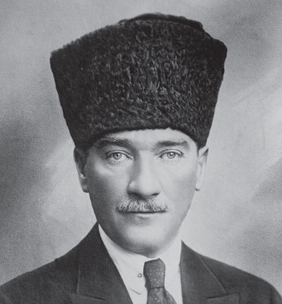Mustafa Kemal Atatürk (1881–1938) was the founder and first president of the Republic of Turkey. More than any other political leader, he was responsible for preserving Turkey’s independence after its defeat in World War I and rebuilding the nation into a modern, secular state.

Atatürk was born in Thessaloniki, a city in the Ottoman Empire. The empire controlled much of eastern Europe and the Middle East, but its economic and military power was in decline. (The Ottomans had been dubbed “the sick man of Europe.”)
After graduating from the Ottoman military academy in 1905, Atatürk joined the army and was stationed in Syria, Libya, and the Balkans. The Ottomans entered World War I in 1914 on the side of Germany and Austria; Atatürk commanded an army division that won a major battle against the British at Gallipoli in 1915.
The eventual Allied victory in 1918, however, spelled the end of the Ottoman Empire: Its territory in the Middle East was divided up between the victorious France and Britain, and the last caliph was deposed. The Allies also planned to divide up Turkey, the heartland of the Ottoman Empire, but Atatürk was able to preserve Turkish unity with a brief war of independence.
The Republic of Turkey was established in 1923, with Atatürk as its president. He set about writing a constitution, founding schools and museums, and implementing social reforms meant to bring Turkey closer to the West. He replaced Arabic characters with a Western-style Turkish alphabet, adopted European-style suits and hats while banning traditional Turkish clothing, and forced Turks to adopt surnames, among other Western customs.
Secularization and modernization were the hallmarks of Atatürk’s rule, and they were also at the core of the philosophy that became known as Kemalism. Long after his death, Turkish military leaders would justify coups against elected governments as necessary steps to protect the founder’s legacy. Atatürk remained in office until his death from liver disease at age fifty-seven.
ADDITIONAL FACTS
- It is illegal in Turkey to insult Atatürk. As recently as 2008, a professor was given a fifteen-month suspended jail sentence for suggesting that Atatürk’s record as a reformer had been exaggerated in history books.
- As part of his reforms to modernize Turkey, Atatürk banned men from wearing the traditional fez—and led by example by donning a Western-style Panama hat.
- He acquired his last name in 1935, when Turkey instituted the Western practice of individual surnames; Atatürk means “Father of the Turks.”
